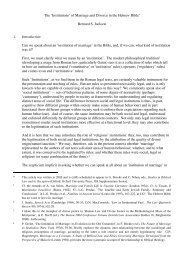Here - Deborah Charles Publications
Here - Deborah Charles Publications
Here - Deborah Charles Publications
You also want an ePaper? Increase the reach of your titles
YUMPU automatically turns print PDFs into web optimized ePapers that Google loves.
- 51 –Benjamin ShmueliBenjamin Shmueli (Bar-Ilan University), A Preliminary Sketch of a Modern Model of Differential Pluralistic Tort Liability basedon the Theories of Maimonides and Calabresi (session 12B)This paper aims at presenting a preliminary sketch of a modern model of differential pluralistic tort Liability based on the differentbut-similartheories of Maimonides and Honorable Prof. Calabresi. Analysis of the theories of Calabresi and Maimonides producesa better understanding of their theories of tort liability, of each one separately and of the advantages and disadvantages of each onerelative to the other. On one hand, the paper uses Calabresi’s modern, coherent, well-argued, and detailed theory to elucidate manyof Maimonides’s rules, which are naturally formulated in less modern terms and are naturally are less well suited to modern reality.Maimonides’s rules often lack a clear and detailed argumentation, which is why they pose significant difficulties if interpretedaccording to the traditional commentary. On the other hand, Maimonides’s unique tort theory challenges even Calabresi’s andmirrors it. Calabresi’s theory is instructive and well-suited for the modern reality of the industrial world (which did not exist inancient times) in which most of the claims are directed against large manufacturers, economic institutions, mass tortfeasors, andtheir insurers. Nevertheless, there is still a need to inject some degree of deontological considerations into Calabresi’s theory, in theappropriate case.An applicative model that contains an outline of a theory of torts inspired by the writings of Maimonides and Calabresiwill be presented. This is an initial outline of a pluralistic model of liability based on the integration of considerations of efficiencyand justice, granting precedence to each consideration depending on the type of activity creating the risk. This model of differentialtort liability is based on Calabresi's "best decider" doctrine, but in conjunction with liability that is not always absolute, rathermixed with fault and at times fault-based, according to Maimonides' suggested categorization of tort events into groups. In theoutline of the model the paper allows greater dominance to strict liability that is not fault-based in the case of insured defendantsand which are loss distributors, and greater dominance to a fault-based regime in the case of individual, uninsured tortfeasors.The division to be presented could be justified not only because of the need to incorporate deontological considerations into thesystem, especially toward uninsured private tortfeasors; it can be justified also for reasons of efficiency, which do not always (or inevery case) justify the imposition of strict liability on an individual, uninsured best decider because it may result in over-deterrenceand in a disincentive to engage in certain activities.Benjamin Shmueli, Ph.D. 2005, LL.M. 1999, LL.B. 1998, is Associate Professor (Senior Lecturer) in Tort, Family, andJewish Law, and Director of the Center for Commercial Law, Bar-Ilan University Law School, Israel. His researchinterests are tort law, parent-child relations, comparative law, and Jewish Law. He has published over 30 publications. Dr.Shmueli was awarded the university president's scholarship for outstanding post- graduate students and a number of prizesfor research. He was a Visiting Professor during 2006-2008 at Duke University School of Law. Dr. Shmueli is the Editorin-chiefand founder of an Israeli peer-reviewed journal: The Family In Law Review. He has organized more than twentyconferences and participated in many more. Yaron SilversteinYaron Silverstein (Zefat Academic College) – Between ‘Halacha without Borders’ and ‘Borders without Halacha’: Aspects ofPrivate International Law in the rabbinical courts (Session 14B)The Jew, it was said a generation ago, carries with him his personal Law wherever he go. This international character of Jewish lawworked during long years of exile, and helped to define effective Jewish law in every Jewish community. When a spouse escapedfrom his community to another, he didn`t get some `New Life` and defense from the new community. He continued to be under thelegal authority of his parent community. In this way, Jewish law turned the Jewish world into a one global community. Thejurisdiction in matters of personal status in the rabbinical courts in Israel, however, changed this position in the internationalcontext. If in the past it was said that Jewish law does not recognize borders and trials of other countries, today the assumption isthat we have to enable, within the framework of Jewish law, space and status for trials in foreign countries. In this lecture we willreview the development of the field of private international law within Jewish law in the context of family law, and point out thedirections of development of this legal area in the recent years.





